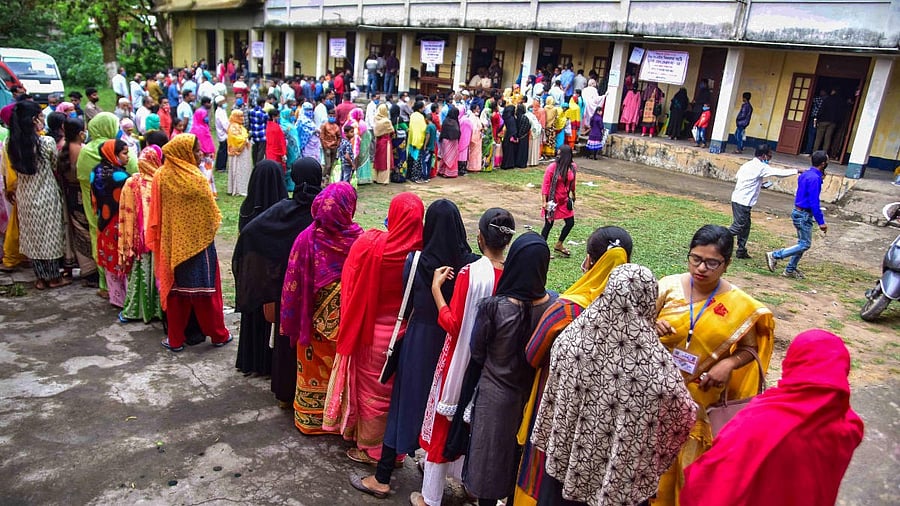
People queuing up outside a polling station in Assam.
Credit: PTI File Photo
Assam, which will go for Assembly elections next year, will have a Special Revision of electoral rolls instead of the Special Intensive Revision (SIR), which is underway in 12 States and Union Territories.
The Election Commission of India on Monday (November 17) said the revision process in Assam will begin on November 22 with booth-level officers (BLOs) conducting house-to-house verification. The draft electoral rolls will be published on December 27. After the claims and objections period (December 27 to January 22, 2026), the final voter list will be published on February 10, 2026.
Unlike the SIR, the special revision will not involve distribution of enumeration forms to voters. Instead, the BLOs will be provided pre-filled registers containing details of all existing electors in their respective polling areas.
During their visits, the BLOs will verify the entries and record cases of dead voters, duplicate entries, and permanently shifted electors. They will also receive Form 6 applications for new voters, Form 7 for deletion or transfer, and Form 8 for correction of any entry.
According to the Election Commission, each BLO must carry at least 30 blank Form 6 and 20 blank Forms 7 and 8 during field work to ensure on-spot facilitation for citizens.
Details of 'D' voters not to be updated
The Election Commission, in its order to the Chief Electoral Officer of Assam, has said that details of 'doubtful' voters or 'D' voters should not be included during the house-to-house verification. Particulars of all such voters have to be carried forward to the draft electoral rolls without any change. Any modification in a 'D' voter's status, including removal or deletion of the 'doubtful' tag can be made only on the basis of an order from the Foreigners Tribunal or a court.
Who are 'D' voters?
Assam is the only State with the 'D' voter or 'doubtful' voter category in its electoral rolls. This system has been in place since 1997.
As part of the Assam Accord of 1985, the Indian government decided that any individual entering Assam illegally after March 24, 1971 would be treated as a foreigner. In 1997, the Election Commission of India directed the Assam government to remove non-citizens from the electoral rolls. Following this, an intensive revision of electoral rolls began in the State. The Election Commission marked nearly 3,70,000 people as 'D' (doubtful) while updating Assam's electoral rolls. They were people whose citizenship status was questionable.
Impact of the tag
Those marked as 'D' voters were barred from contesting elections and casting their votes.
The Election Commission directed that their cases be referred to Foreigners Tribunals, where individuals are asked to prove their Indian nationality by producing documents such as birth certificates, land records, and legacy data. The process continues to this day.
In 2005, when another house-to-house survey was carried out by the Election Commission, it was found that a huge number of people who had been marked as 'D' voters in 1997, could not be traced. The number of 'D' voters was then officially revised to 1,81,619.
In 2024, Assam Chief Minister Himanta Biswa Sarma said the State has 96,987 ‘D' voters and over 89,000 had been removed from the tag from 1997 to 2023. He also said that 26,144 ‘D' voters had received Foreigners Tribunal notice while 11,819 cases were pending.
Fear of remaining disenfranchised
The nearly one lakh people marked as ‘D voters' will remain disenfranchised if they do not receive legal clearance from a tribunal or court, as there will be no change in their status in the upcoming Special Revision of electoral rolls.
The issue gains significance owing to Assam's long history of migration, identity politics, and citizenship verification process, including the National Register of Citizens exercise.